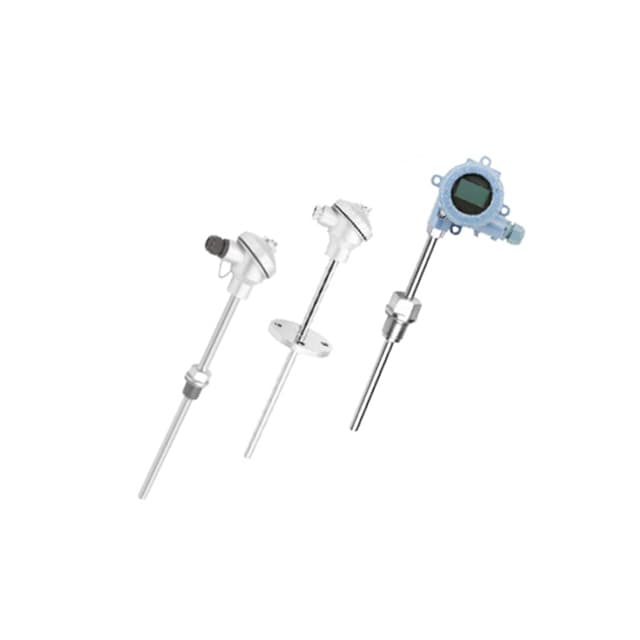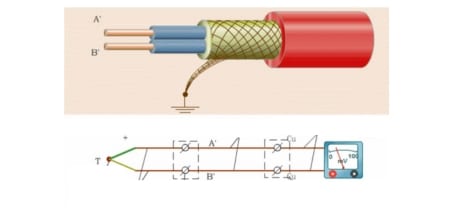Thermocouple is temperature sensor used in a wide range of industries. It is popular for its simple design, wide temperature measurement range and high reliability. But what exactly is a thermocouple and how does it work?
What is A Thermocouple?
A thermocouple is a temperature sensor(PCT Thermocouple Temperature Transmitter) made up of two different types of metal wires that are connected together at one end to form a contact known as the “hot end” where the temperature is measured. The other end of the wires is connected to a reference contact, which is usually held at a known and stable temperature.

Thermocouple Working Principle
Thermocouples work on the basis of the Seebeck effect. This effect describes the electric potential (EMF) or voltage that occurs when there is a temperature difference between the joints of two different metals and their free ends. The magnitude of this voltage is proportional to the temperature difference between the hot and cold ends.
How Do Thermocouples Work?
The working process of a thermocouple can be understood through the following three key components:

Thermocouple Hot Junction
The hot end is the end point where two different metal wires are joined together and is the actual location where the temperature is measured. When the hot end is exposed to the temperature to be measured, a voltage difference is created between the two metals.
Thermocouple Output Connection (TOC)
This is the connection point between the thermocouple and the measuring instrument through which the voltage generated by the thermocouple is transmitted to an external measuring device or data acquisition system. This part is usually a metal connector or wire connected to the external device.
Thermocouple Cold Junction
The cold end is the other end of the thermocouple and is usually held at a known and stable temperature. The temperature of the cold end is often used to compensate for the cold end when calculating the measured temperature so that the temperature of the hot end can be accurately determined.
Thermocouple Leads
Thermocouple leads are wires that connect the hot and cold ends of a thermocouple and are usually made of the same metal or alloy as the thermocouple material. The leads transmit the voltage generated at the hot end to an external device. Depending on the type of thermocouple and the application environment, the material and construction of the leads may vary to ensure accurate signal transmission and stability.
Thermocouple Voltage
The voltage produced by a thermocouple is caused by the temperature difference between the hot and cold ends. The voltage is usually very small, usually in the microvolt (µV) to millivolt (mV) range. Its magnitude is calculated by the following formula:

NOTES:
V is the electric potential (voltage) generated.
S is the Seebeck coefficient, which depends on the material properties of the two metals used.
Thot is the temperature of the hot end.
Tcold is the temperature of the cold end.
Measured voltages are compared to standard thermocouple tables that correspond the voltage to the temperature of a particular thermocouple type. To ensure accurate temperature readings, the cold end temperature is also taken into account, usually through cold end compensation.
The cold end (reference contact) is not always held at 0°C (which is ideal for simplifying calculations). In fact, the cold end is usually at ambient temperature and this temperature can vary. For this reason, it is necessary to correct the measured voltage by cold-end compensation to eliminate the effect of cold-end temperature variations on the measurement results, so that the hot-end temperature can be accurately determined.
Summary
Thermocouples utilize the Seebeck effect to produce a voltage by detecting the temperature difference between the hot and cold ends. By measuring this voltage and referring to a standard thermocouple meter, it can be accurately converted into a temperature reading. The working principle of thermocouples makes them valuable in a variety of industries, from industrial processes to scientific research, thermocouples are indispensable tools when reliable and accurate temperature measurement is required.
When looking for a high-performance temperature measurement solution, Apure is your best choice. We offer a wide range of advanced measurement instruments including multi-parameter water quality analyzers, flow measurement instruments, level measurement instruments, temperature measurement instruments and pressure measurement instruments. Whether you have industrial applications or research needs, Apure’s products provide you with accurate data and reliable performance. Feel free to contact us for more product information and customized solutions.
